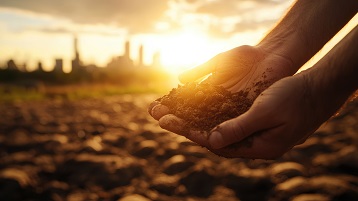Bringing urban land back to life

Land is the basis for a healthy life – in the countryside as well as the city. But what can be done when urban areas no longer have green spaces or land for neighborhood gardens? The answer is in the modular university course materials currently being developed by TH Köln, the G20 Global Land Initiative of the United Nations Convention for Combating Desertification and United Nations University.
Gardens, parks, green spaces – ideally, ecosystems in a city help to purify air and water as well as lower the temperature in summer – we may refer to these as ecosystem services. However, the reality is often sealed soils, a lack of vegetation and waste and exhaust fumes from industry, traffic and households. The result: land degradation. This term describes the deterioration of soils and ecosystem services, up to the point where they completely lose their ecological and economic functions. This process can be halted by land restoration: measures such as vertical farming, the redesign of river courses or soil protection ensure that urban land live again.
“The international community has pledged to restore almost one billion hectares of land by 2030. But the pace is lagging behind expectations worldwide. The key to changing this is education,” explains Dr. Nazmul Huq from the Faculty of Spatial Development and Infrastructure Systems. He is part of a large-scale project: together with the G20 Global Land Initiative, the United Nations Convention for Combating Desertification (UNCCD) and the United Nations University (UNU), TH Köln is developing free courses on Urban Land Restoration, which are to be offered at least at 1,000 universities worldwide.
Sign up to stay informed:
Five modules for innovative solutions
“The course material is developed for teachers at universities and educational institutions,” says Huq. “Teachers will receive an explanatory manual, a complete set of teaching materials and ten case studies on urban land restoration.” The program will consist of five modules that demonstrate innovative solutions for urban renaturation – from linking cities to landscapes and society, approaches to sustainable urban land management, land-sensitive urban planning and enabling urban land restoration to innovations in urban renaturation.
Since July, the project partners have been developing these materials together with the Universidad de Cuenca (Ecuador), Ain Shams University (Egypt), Kenyatta University (Kenya), Universitas Gadjah Mada (Indonesia) and the University of Oxford (England). From next April, teachers all over the world will be able to download the English-language material and integrate it into existing courses, either in a modular form or in its entirety. Furthermore, starting in May 2025, the project partners will offer online webinars and workshops introducing the course materials and providing pedagogics tips. The project also aims to create “communities of practice” to support educators as they integrate the course materials in their curricula.
The need for experts in land restoration is great, because although urban areas cover less than 1 percent of the earth's land area, it is where more than half of the world's population lives. “More and more people are moving to urban areas,” says Dr. Karen Sudmeier-Rieux, Project Manager and Environmental Education Outreach Specialist at the G20 Global Land Initiative. “Cities are becoming hotspots, quite literally. People need as many green spaces as possible for securing food, managing flooding and water scarcity.”
The “Trigger Change!” series
The teaching materials on Urban Land Restoration are part of the “Trigger Change!” series of the G20 Global Land Initiative. Four programs with different focuses are intended to anchor restoration in university curricula around the world. A course on innovative solutions to sustainable agriculture for land restoration was published in 2024. Similar courses are planned for forestry and mining.
For more information on how to receive the “Trigger Change! Innovations in sustainable agriculture for land restoration” course: https://g20land.org/trigger-change/
The G20 Global Land Initiative
The G20 is an association of 19 countries, the European Union and the African Union. It serves as a forum for exchange on the international economic and financial system, but also for the coordination of global issues such as climate policy, women's rights, educational opportunities, migration and terrorism. The goal of the G20 Global Initiative on Reducing Land Degradation and Enhancing Conservation of Terrestrial Habitats is to reduce land degradation by half by 2040.
December 2024
